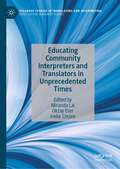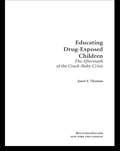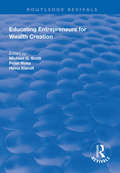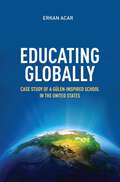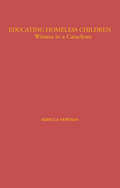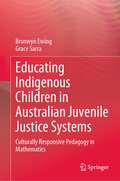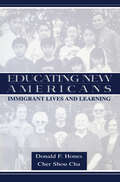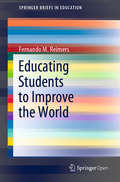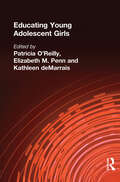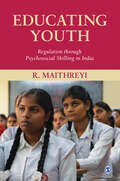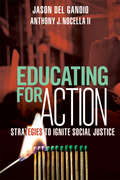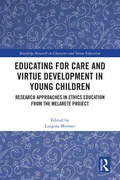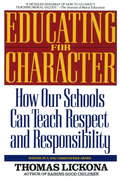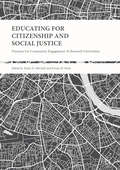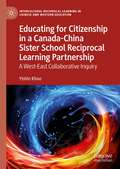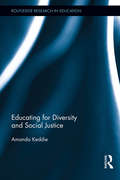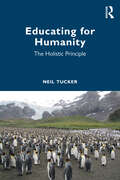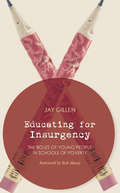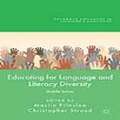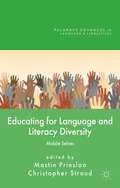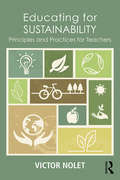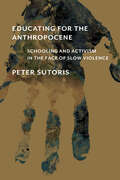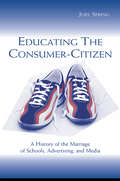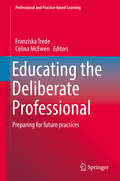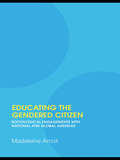- Table View
- List View
Educating Community Interpreters and Translators in Unprecedented Times (Palgrave Studies in Translating and Interpreting)
by Miranda Lai Oktay Eser Ineke CrezeeThis edited book features contributions from interpreter and translator educators globally, in which they discuss changes to teaching, assessment and practice as a result of the COVID-19 pandemic. The chapters provide a comprehensive picture of educators’ responses to challenges and opportunities. The book will be of interest to students, researchers and educators, as well as government language policymakers and stakeholders of translation and interpreting agencies.
Educating Drug-Exposed Children: The Aftermath of the Crack-Baby Crisis
by Janet Y. ThomasThis is the first book to use teachers' experiences to understand how prenatal drug exposure affects children's' development , and how social construction of the problem influences perceptions within schools.
Educating Entrepreneurs for Wealth Creation (Routledge Revivals)
by Peter Rosa Michael G. Scott Heinz KlandtPublished in 1998, this book moves away from the basic education of entrepreneurs to new models and methods, often running in cooperation with orthodox management courses in institutes of higher education. The papers in this book develop themes, models and concepts for the education of wealth creating entrepreneurs.
Educating Globally: Case Study of a Gulen-Inspired School in the United States
by Erkan AcarThe purpose of this case study is to describe the characteristics of a Gulen-inspired School (GIS) in the United States. The study identifies the dynamics of a US based GIS in terms of the school's curriculum, history, educational success, hiring practices, admission processes and networking. In order to understand its unique meaning and significance, interviews and observations were conducted in one GIS located in the northeast region of the United States. Gulen inspired schools are those founded around the world by the volunteers of the Gulen (or Hizmet) Movement. Gulen-inspired schools provide all levels of education (K-12 and college levels) in different educational systems. These schools are inspired by the educational philosophy of Fethullah Gulen, a Turkish-Muslim scholar living in the United States, and numbered around 1,000 in more than 150 countries throughout the world.
Educating Homeless Children: Witness to a Cataclysm (Children of Poverty)
by Rebecca NewmanNewman's ethnographic study considers the ways in which the family and school environments of eleven homeless school children affected their school performance. Homelessness is revealed to be multi-faceted, serving simultaneously as a cause, result, and potentiator of their families' problems. A variety of initiatives in the realms of policy, research, and practice are suggested for addressing the problems of these youngsters, as well as the problems of the many other extremely poor school children. First published in 2000. Routledge is an imprint of Taylor & Francis, an informa company.
Educating Indigenous Children in Australian Juvenile Justice Systems: Culturally Responsive Pedagogy in Mathematics
by Bronwyn Ewing Grace SarraThis book addresses key issues in the context of the national policy of educating children accused of crimes in Juvenile Courts in Australia. For several decades, National and State Governments in Australia have struggled to define education, constantly seeking to improve the way society applies the concept. This book presents an accurate portrayal of consequences of the education policy of trying to educate troubled children and young people in trouble with the law. It describes the work of juvenile detention centre mathematics teachers and their teaching contexts. It portrays teachers as learners, who ventured with researchers with a theoretical perspective. This book focuses on culturally responsive pedagogies that seek to understand the ways Indigenous children and young people in juvenile detention make sense of their mathematical learning, which, until the time of detention, has been plagued by failure. It examines how the underperformance of Aboriginal and Torres Strait Islander students, and students from low socioeconomic backgrounds are strong determinants of their overrepresentation in the juvenile justice system in Australia. This book presents the argument that if the students’ literacy and numeracy levels can be improved, there is opportunity to build better futures away from involvement in the juvenile justice system and towards productive employment to improve life chances.
Educating New Americans: Immigrant Lives and Learning (Sociocultural, Political, and Historical Studies in Education)
by Donald F. Hones Shou C. Cha Cher Shou ChaEducating New Americans examines what it means to be an American through the history of a refugee from Laos. Shou Cha is a community liaison for an elementary school, an evangelical preacher, a community leader, a husband, and a father. His lifetime of learning, presented mainly in his own voice, is framed by various historical and sociological contexts that have shaped his life, the lives of other Hmong refugees, and the lives of other Americans, old and new. These contexts include the history of immigrant education policies in the United States, as seen through the lives of immigrant children; the historical and sociological impact of warfare as well as missionary work in the lives of the Hmong people; and the sociology of generational conflict, especially as it is felt among immigrant groups. Finally, this book suggests that immigrant parents such as Shou Cha can contribute to the process of teaching peace to children, and making peace between diverse groups in America, the land of e pluribus unum.
Educating Students to Improve the World (SpringerBriefs in Education)
by Fernando M. ReimersThis open access book addresses how to help students find purpose in a rapidly changing world. In a probing and visionary analysis of the field of global education Fernando Reimers explains how to lead the transformation of schools and school systems in order to more effectively prepare students to address today’s’ most urgent challenges and to invent a better future. Offering a comprehensive and multidimensional framework for designing and implementing a global education program that combines cultural, psychological, professional, institutional and political perspectives the book integrates an extensive body of empirical literature on the practice of global education. It discusses several global citizenship curricula that have been adopted by schools and school networks, and ties them into an approach to lead school change into the uncharted territory of the future. Given its scope, the book will help teachers, school and district leaders tackle the change management needed in order to introduce global education, and more generally increase the relevancy of education. In addition, the book offers a “bridge” for more productive collaboration and communication between those who lead the process of educational change, and those who study and theorize this important work.At a time when the urgency of our shared global challenges calls for more understanding and collaboration and when the rapid transformation of societies requires that we help students develop a clear sense of relevancy and purpose, this book offers a way to pursue deep and sustainable change in instruction and school culture, so that students learn that nothing human is foreign and that they can find meaning in lives aligned with audacious purposes to make the world better.
Educating Young Adolescent Girls
by Kathleen B. DeMarrais Elizabeth M. Penn Patricia O'ReillyThis text for preservice and in-service teacher education courses shows how schools can educate girls and promote their positive self-esteem at the same time. Its purpose is to help teachers facilitate the development of gender-equitable schools and classrooms. Taking a feminist developmental approach, the text draws on an interdisciplinary knowledge base, synthesizing research from psychology, anthropology, sociology, and education. While it is rooted in scholarly research, the focus is on clarifying the connection between theory and practice, with an emphasis on practical applications. The text is organized in two sections--"Growth and Development" and "Teaching and Learning"--and includes a variety of engaging pedagogical features. Underscoring the need for teachers, school administrators, and parents to become aware of the intersection of development and education, Educating Young Adolescent Girls: *combines gender, growth, and development; *demonstrates how schooling can facilitate the total development of young adolescent girls; and *addresses a multiplicity of issues, including adolescent girls of color and young adolescents girls' sexuality.
Educating Youth: Regulation through Psychosocial Skilling in India
by R. MaithreyiEducating Youth: Regulation through Psychosocial Skilling in India studies the rise in skill-based developmental interventions for young people that aim to harness youth potential. Tracing these changes to the neoliberalization of education and training globally, this book discusses how a range of training programs, from social and personality development skills to employability and vocational skills, seek to cultivate an ethic of self-responsibility through skilling, to overcome structural disadvantage among the marginalized youth. Examining one such form of training in depth, Life Skills Education or LSE, that is advocated by international organizations, such as WHO and UNICEF, and popularized in India by various actors---from the state departments of education to local non-governmental organisations and middle-class citizens—this book shows how these programmes get adapted and modified within the Indian context. It demonstrates how authoritarian adult–child relations, caste inequalities and rote culture inflect the messages for self-development that the programmes transmit. Discussing the impact of these psychosocial skilling programmes observed in the Indian context, the book reflects on the cultural disconnects and internal limitations of liberal, progressive and experiential pedagogies in achieving intended outcomes.
Educating for Action
by Jason Del Gandio Anthony J Nocella IIThe pursuit of freedom and justice is a timeless one, but new activists may not know where to begin, while more experienced ones often become jaded or fatigued. The task of constructing a new society, free from oppression and inequality, can be overwhelming. Tools for facilitating motivation, engagement, and communication can mean the difference between failure and success for activists and social movements.Educating for Action collects the voices of activists whose combined experience in confronting injustice has generated a wealth of key insights for creating social change. This practical guide explores such topics as: Community activism and direct democracy Conflict negotiation, communication, and rhetoric Law, the educational system, and lifestyle activism Social media skills, conference planning, and online organizingWritten in an inspirational tone, Educating for Action consciously straddles the line between street activism and classroom instruction. Bridging the gap between these two worlds makes for an engaging and instructive manual for social justice, helping students, teachers, and larger activist communities turn their idealism into action.Jason Del Gandio is a scholar-activist and assistant professor of rhetoric and public advocacy at Temple University. He is the author of Rhetoric for Radicals: A Handbook for 21st Century Activists.Anthony J. Nocella II is a scholar-activist and senior fellow of the Dispute Resolution Institute at the Hamline Law School. He is a long-time anti-racism, youth justice, prison abolition, hip hop, animal, disability, and Earth liberation activist and has published over fifty scholarly articles and book chapters and sixteen books.
Educating for Care and Virtue Development in Young Children: Research Approaches in Ethics Education from the MelArete Project (Routledge Research in Character and Virtue Education)
by Luigina MortariThis book champions care education in early childhood school contexts, addressing the critical need for an effective and meaningful ethics education grounded in Platonic and Aristotelian reflections on virtues, and ultimately positing a theory of ethics education that connects ancient philosophy to contemporary care thinking.This theory is supported by the empirical findings of the MelArete Project, a 10-year research project in care and virtues education that guides children’s attention to the concepts of care and virtues. Unique amongst contemporary virtue and character approaches, Mortari and her colleagues have developed a rich research base that combines recent educational theories with ancient and continental philosophy.Ultimately arguing for an ethics education centered on care in the wake of our current ethical crisis, the book contributes to a growing body of literature on prominent virtue and character education programs around the world and will therefore appeal to scholars, researchers, and postgraduate students working in moral and values education, ethics education, and educational theory more broadly. Care ethicists and early childhood educators will also benefit from this volume.
Educating for Character: How Our Schools Can Teach Respect and Responsibility
by Thomas LickonaCalls for renewed moral education in America's schools, offering dozens of programs schools can adopt to teach students respect, responsibility, hard work, and other values that should not be left to parents to teach.
Educating for Citizenship and Social Justice
by Krista M. Soria Tania D. MitchellIn this edited volume, authors explore the ways in which departments, programs, and centers at public research universities are working to better engage students in the work of citizenship and social justice. The chapters in this book illuminate the possibilities and challenges for developing community engagement experiences and provide evidence of the effects of these efforts on communities and undergraduate students' development of citizenship outcomes. This text reveals how important the integration of our intentions and actions are to create a community engaged practice aimed towards justice.
Educating for Citizenship in a Canada-China Sister School Reciprocal Learning Partnership: A West-East Collaborative Inquiry (Intercultural Reciprocal Learning in Chinese and Western Education)
by Yishin KhooThis book enriches the discourse around Global Citizenship Education in teacher education through the example of a teacher's experience in a Canada-China Sister School reciprocal learning landscape. Instead of positioning global citizenship teaching and learning as a set of fixed goals to be attained by teachers alone, this book approaches global citizenship teaching and learning as unfinished lifework in progress and as situated curriculum problems to be inquired together by university researchers, school teachers, and students under the spirit of reciprocity and community. This reimagination of narratives, theory, and action start from collaborative and reciprocal learning partnerships among Chinese and Canadian researchers and teachers in the practicality of re-searching and re-enacting the purpose and meanings of twenty-first century education in a Canada-China Sister School setting.
Educating for Diversity and Social Justice (Routledge Research in Education)
by Amanda KeddieEducating for Diversity and Social Justice foregrounds the personal stories of educators who are engaging the space of schooling as a site of possibility for realizing the goals of social justice. It is a book inspired by a vision of education as a practice of freedom where young people – especially those who are marginalized – can learn that they have a voice and the power to change their world for the better. Drawing on the work of US philosopher Nancy Fraser, the book examines issues of justice and schooling in relation to three dimensions: political, cultural and economic. While its focus is on research within three Australian case study schools, the book provides an international perspective of these dimensions of justice in western education contexts as they impact on the schooling performance of marginalized students. Towards greater equity for these students, the book presents a comprehensive scaffold for thinking about and addressing issues of schooling, diversity and social justice. Through practical examples from the case study research, the book illustrates the complexities and possibilities associated with schools providing inclusive environments where marginalized voices are heard (political justice), where marginalized culture is recognized and valued (cultural justice) and where marginalized students are supported to achieve academically towards accessing the material benefits of society (economic justice).
Educating for Humanity: The Holistic Principle
by Neil TuckerThis book explores the international landscape of educational scholarship, policy, and practice. Tucker argues there is a fundamental aim for world education. It is to educate complete human beings in all their dimensions, such that they become the best persons they can be, and participate fully in ‘the human story’.Tucker asks: What is the world of education for? What is it that early childhood centers, schools and local communities are meant to do for children and their learning? Representing a decade of research, the text examines the most common concepts of the purposes of education, human nature and learning offered by scholars, international authorities and pedagogies, nations, education organizations, neuroscience, early childhood educators, and individual schools. To ‘educate for humanity’, Tucker provides a complete concept of holistic education – of whole child and holistic learning for a whole world.The book is an essential resource for those involved in the world of education – teachers, university administrators, school authorities, policy makers, and educational organizations. Parents and community members with a strong interest in the education of all children will also find much that is informative and challenging to think about.
Educating for Insurgency
by Bob Moses Jay GillenA manifesto for today's broken schools.Desegregation has failed. Schools filled with black and brown students have become plantations of social control, where the policing of behavior trumps the expanding of minds. Radical teachers and organizers in American public schools must help young people fashion an insurgency. That means, at the very least, seeing each student's rebellion not as violation, but as communication.Jay Gillen writes with passion and compassion about the daily lives of poor students trapped in institutions that dismiss and degrade them. In the spirit of Paulo Freire, and using the historical models of slave rebellions and Civil Rights struggles as guides, Gillen explains what sort of insurgency is needed and how to create it: the tools and techniques required to build social, intellectual, and political power.This poetic manifesto of revolutionary "educational reform" belongs in the pocket of anyone who currently works in, suffers through, or simply cares about public schooling in this country.Jay Gillen teaches English in a Baltimore public school and has worked with the Baltimore Algebra Project since 1995, building math literacy among youth of color and youth experiencing poverty in US public schools.Bob Moses is an educator and Civil Rights activist. He founded the Algebra Project in 1982.
Educating for Language and Literacy Diversity
by Mastin Prinsloo Christopher StroudEducators and researchers in variety of locations increasingly encounter linguistically and socio-culturally diverse groups of students in their classrooms and lecture halls. This book examines everyday forms of talk and writing in relation to standardised forms and schooling expectations to suggest ways forward in educational discourse.
Educating for Language and Literacy Diversity: Mobile Selves (Palgrave Advances In Language And Linguistics Ser.)
by Mastin Prinsloo Christopher StroudEducators and researchers in variety of locations increasingly encounter linguistically and socio-culturally diverse groups of students in their classrooms and lecture halls. This book examines everyday forms of talk and writing in relation to standardised forms and schooling expectations to suggest ways forward in educational discourse.
Educating for Sustainability: Principles and Practices for Teachers
by Victor NoletEducating for Sustainability presents fundamental principles, theoretical foundations, and practical suggestions for integrating education for sustainability into existing schoolwide systems and programs, organized in three sections: Principles of Education for Sustainability; Fostering a Sustainability Worldview; Learning and Thinking for Sustainability. Designed for teachers and teachers-to-be at all grade levels and across the content areas, the focus is on professional practices and pedagogical approaches rather than specific topics often associated with sustainability. Each chapter includes a number of supports to help readers monitor and improve their own professional practice and to deepen their own sustainability wordview, including textboxes in most chapters that provide more detailed or specialized information and a range of application exercises. All chapters include several "Consider This" activities and an "Extend Your Professional Knowledge" feature. Directly grounded in K-12 classroom practice, this book presents useful and realistic information for teachers looking to reorient their work toward sustainability and help their students develop new thinking and problem-solving abilities.
Educating for the Anthropocene: Schooling and Activism in the Face of Slow Violence
by Peter SutorisThe work of environmental educators and activists in India and South Africa offers new models for schooling and environmental activism.Education has never played as critical a role in determining humanity&’s future as it does in the Anthropocene, an era marked by humankind&’s unprecedented control over the natural environment. Drawing on a multisited ethnographic project among schools and activist groups in India and South Africa, Peter Sutoris explores education practices in the context of impoverished, marginal communities where environmental crises intersect with colonial and racist histories and unsustainable practices. He exposes the depoliticizing effects of schooling and examines cross-generational knowledge transfer within and beyond formal education. Finally, he calls for the bridging of schooling and environmental activism, to find answers to the global environmental crisis.The onset of the Anthropocene challenges the very definition of education and its fundamental goals, says Sutoris. Researchers must look outside conventional models and practices of education for inspiration if education is to live up to its responsibilities at this critical time. For decades, environmental activist movements in some countries have wrestled with questions of responsibility and action in the face of environmental destruction; they inhabited the mental world of the Anthropocene before much of the rest of the world. Sutoris highlights an innovative research methodology of participatory observational filmmaking, describing how films made by children in the Indian and South African communities provide a window into the ways that young people make sense of the future of the Anthropocene. It is through their capacity to imagine the world differently, Sutoris argues, that education can reinvent itself.
Educating the Consumer-Citizen: A History of the Marriage of Schools, Advertising, and Media (Sociocultural, Political, and Historical Studies in Education)
by Joel SpringIn Educating the Consumer-Citizen: A History of the Marriage of Schools, Advertising, and Media, Joel Spring charts the rise of consumerism as the dominant American ideology of the 21st century. He documents and analyzes how, from the early 19th century through the present, the combined endeavors of schools, advertising, and media have led to the creation of a consumerist ideology and ensured its central place in American life and global culture. Spring first defines consumerist ideology and consumer-citizen and explores their 19th-century origins in schools, children's literature, the commercialization of American cities, advertising, newspapers, and the development of department stores. He then traces the rise of consumerist ideology in the 20th century by looking closely at: the impact of the home economics profession on the education of women as consumers and the development of an American cuisine based on packaged and processed foods; the influence of advertising images of sports heroes, cowboys, and the clean-shaven businessman in shaping male identity; the outcomes of the growth of the high school as a mass institution on the development of teenage consumer markets; the consequences of commercial radio and television joining with the schools to educate a consumer-oriented population so that, by the 1950s, consumerist images were tied to the Cold War and presented as the "American way of life" in both media and schools; the effects of the civil rights movement on integrating previously excluded groups into the consumer society; the changes the women's movement demanded in textbooks, school curricula, media, and advertising that led to a new image of women in the consumer market; and the ascent of fast food education. Spring carries the story into the 21st century by examining the evolving marriage of schools, advertising, and media and its ongoing role in educating the consumer-citizen and creating an integrated consumer market. This book will be of wide interest to scholars, professionals, and students across foundations of education, history and sociology of education, educational policy, mass communications, American history, and cultural studies. It is highly appropriate as a text for courses in these areas.
Educating the Deliberate Professional
by Franziska Trede Celina McewenThis book takes a fresh look at professional practice and professional education. In times of increased managerialism of academic teaching and a focus on graduate learning outcomes, it discusses possibilities to teach and learn otherwise. A deliberate professional is someone who consciously, thoughtfully and courageously makes choices about how to act and be in the practice world. A pedagogy of deliberateness is introduced that focuses on developing the following four characteristics of professionals: (1) deliberating on the complexity of practice and workplace cultures and environments; (2) understanding what is probable, possible and impossible in relation to existing and changing practices; (3) taking a deliberate stance in positioning oneself in practice as well as in making technical decisions; and (4) being aware of and responsible for the consequences of actions taken or actions not taken in relation to the 'doing', 'saying', 'knowing' and 'relating' in practice. Educating the deliberate professional is a comprehensive volume that carves out and explores a framework for a pedagogy of deliberateness that goes beyond educating reflective and deliberative practitioners. As a whole, this book argues for the importance of educating deliberate professionals, because, in the current higher education climate, there is a need to reconcile critique (thinking), participation (doing) and moral responsibility (relating to others) in professional practice and professional education.
Educating the Gendered Citizen: sociological engagements with national and global agendas
by Madeleine ArnotGlobalisation and global human rights are the two major forces in the twenty-first century which are likely to shape the sort of learner citizen created by the educational system. Schools will be expected to prepare young men and women for national as well as global citizenship. Male and female citizens will need to adapt to new social conditions, only some of which will encourage gender equality. This book offers a unique introduction to the contribution that sociological research on the education of the citizen can make to these national and global debates. It brings together for the first time a selection of influential new and previously published papers by Madeleine Arnot on the theme of gender, education and citizenship. It describes feminist challenges to liberal democracy, the gendered construction of the ‘good citizen’ and citizenship education; it explores the implications of social change for the learner citizen and offers alternative gender-sensitive models of global citizenship education. Reaching right to the heart of current debates, the chapters focus on: feminist democratic values in education teachers’ constructions of the gendered citizen European languages of citizenship the inclusion of women’s rights into English citizenship textbooks gender struggles for equality in school pedagogy and curriculum the implications of personalised learning for the individualised learner citizen globalisation and the construction of a global ethic for citizenship education . It will be an invaluable text for all those interested in citizenship education, gender studies, sociology of education, educational policy studies, critical pedagogy and curriculum studies and international or comparative education.
